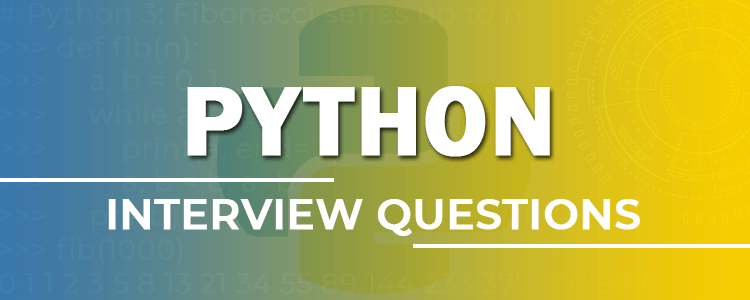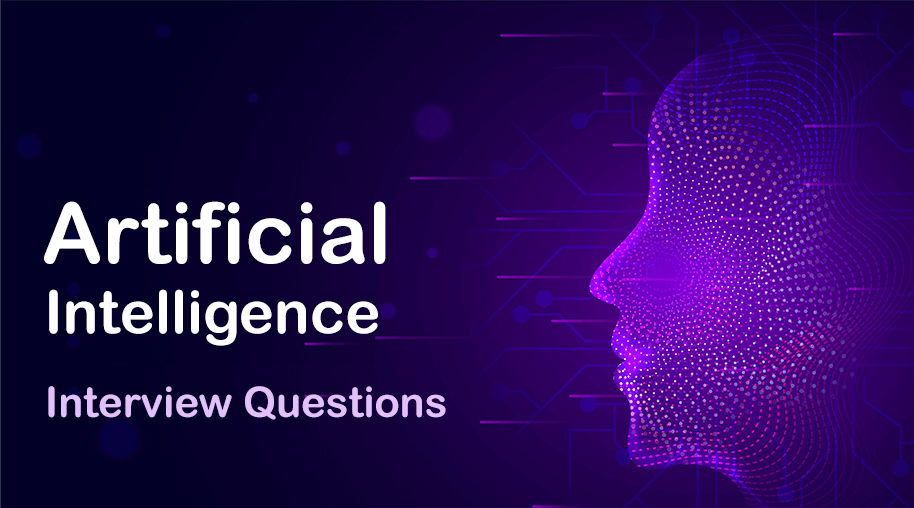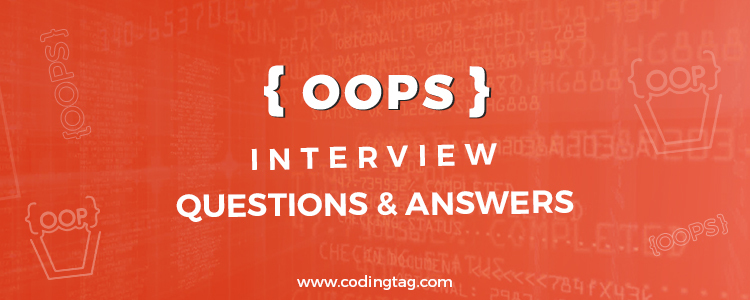Top 30 Python Interview Questions
Last Updated by Monika Dadool
0 11713
Are you also looking for a career in the field of Data Science, Machine Learning, or Python coding; then you must be preparing for or have already lined up some interviews.
As an initiative to help you through the preparation, we have prepared a list of Python Interview Questions including all the major concepts such as Python features, applications, operators, and many more.

Advanced PYTHON Interview Questions Answers List
1) What is Python Programming?
Python is a high-level scripting language that is object-oriented, interpreted, and highly readable. Python instills automatic memory management and can be run equally on multiple OS and platforms.
The language is mainly used for website development, software development, and system scripting.
2) State some of the applications of Python.
Some of the applications of Python language are in given below domains:
- Artificial Intelligence
- Website Development
- Computational and Scientific Development
- Gaming Applications
- Graphic Design and Image Processing
- Operating System
- Language Development
- GUI based desktop applications
3) Why is Python extensively used for web development?
Some of the major reasons why Python programming is extensively used are:
- The syntax used for Python language is much simpler and easy to learn as compared to other programming languages.
- With Python programming, fewer lines of code are required for the programs.
- Python is platform-independent for various platforms such as Linux, Windows, Mac, etc.
- Python programming is a procedural and object-oriented language.
- As the programming language is written on an interpreter, the code can be executed simultaneously.
4) Can you name some of the popular companies using Python language?
Some of the companies which use Python language are:
- YouTube
- Dropbox
- NETFLIX
- BitTorrent
- NASA
5) Why is the PYTHONPATH environment variable used in Python?
PYTHONPATH environment variable is similar to the PATH function which indicates the location of different modules which has been imported into the Python code. It includes all the file directories containing the Python source code.
6) Can you dictate the purpose of PYTHONHOME, PYTHONSTARTUP, and PYTHONCASEOK, environment variables?
PYTHONHOME is an alternate path function that is generally embedded in the PYTHONPATH variables to make the switching between modules convenient.
PYTHONSTARTUP is run every time the Python interpreter runs and consists of the initialization file including the Python source code.
PYTHONCASEOK is used to detect the import statement's first case-insensitivity match and can be activated by assigning any value.
7) What do you mean by identity operators in Python?
Identity Operators in Python are used to check the type of data included in the variable.
There are two types of identity operators in Python:
- Is: returns true if type of value on both sides are the same
- Is not: returns true if type of value on both sides are different
8) What is the function of membership operators in Python?
The membership operators in Python are used to validate for the sequence of membership of data types such as string, list, tuples, etc. In Python, there are two membership operators:
- In: return true if the value is in sequence.
- Not in: return true if the value is not in sequence.
9) Which data types are supported in Python?
- Strings
- Numbers
- List
- Tuples
- Dictionary
10) What is the Difference between Deep copy and Shallow copy?
In the deep copy, a new compound object is created and the objects from the original are copied in it.
In shallow copy, a new compound object is created and the reference to the original object is included.
11) Suppose we want to print "Coding Tag" in Python, how do we code it in python? Does it require less code as compared to Java or C++?
Yes, as compared to C++ and JAVA, Python will require less coding to print "Coding Tag".
For example, we just have to write:
print('Coding, Tag!')

12) How is the memory management carried out in Python?
The memory in Python is automatically managed through the private heap space which includes all the data structures and data of the source code.
13) Is Python programming language dynamically typed?
Yes, Python programming language is dynamically typed where the type of the variable is unknown unless the code is executed.
14) In a Python code, is semicolon mandatory?
No, the semicolon in Python is not mandatory.
15) Which tools in Python are used for static analysis of the code?
Some of the tools used for static analysis of Python code are:
PyChecker for checking the errors and complexity bugs in the code.
Pylint to check whether the modules meet up to the coding standards.
16) How many Keywords are found in Python vocabulary?
33 keywords
17) What do you mean by namespace in Python?
In Python, the namespace is used to ensure that each name is unique to avoid naming conflicts.
18) What is Dictionary in Python and how is it implemented?
Dictionary in Python is used to store the collection of data types. It is implemented in the form of key: value pair where each pair is separated with a colon and every key with a comma.
19) Which function can be used to get all the values of objects present in the dictionary?
values() function is used to extract all the values of objects which are present in the Python dictionary for which the syntax is:
dictionary_name.values()
20) Which function is used in Python to remove the elements from a dictionary?
In Python, functions which are used for removing the elements from a dictionary are:
del to remove all the elements and sometimes, the whole dictionary
pop() or popitem() to remove specific dictionary elements
clear() to remove all the elements at once.
21) List all the flavors of Python.
- Jython
- Anaconda Python
- PyIMSL Studio
- IronPython
- Pypy
- ActiveState ActivePython
- Stackless Python
- Pythonxy
- Portable Python
22) What is Type Conversion in Python?
Type Conversion in Python is used to convert one data type into another. Some of the type conversion functions in Python are:
int(): convert into integer
float(): convert into floating type
tuple(): convert into tuple type
ord(): convert a character into an integer
oct(): convert a character into octal
hex(): convert a character into hexadecimal
list(): convert a character into a list type
set(): returns the type after converting to set type
str(): convert a character into a string type
dict(): convert a character into dictionary type
23) What are decorators in Python?
Decorators in Python are used to extend the behavior of any function by embedding another function within it, eliminating the need for explicit function modification.
24) Why are Pipes used in Python?
Pipes in Python are basically a block of memory that is read by the other processes. The pipes chain one process with another in such a way that the output of one process acts as an input for the other, simplifying the data sharing.
25) What is the difference between the Named pipe and the Anonymous pipe?
Anonymous pipes in Python are instilled within the process and are used for data sharing between the parent and child applications.
On the other hand, Named pipes are used externally and need not relate to one another.
26) What is Monkey Patching in Python?
Monkey Patching in Python is used to reopen any existing method or class at the runtime to modify it and make changes.
27) What is the output of print(str*3) if str = "CodingTag"?
The code will print CodingTag 3 Times

28) What is the output of print(str[0]) if str ="python software"?
The output will be 'p' as it will print the string element at index 0.

29) Can you write the code to sort a number list in Python?
numbers = [55, 11, 44, 22, 33]
numbers.sort()
print(numbers)
Output:

30) The function of len(string) in Python?
The len(string) function in Python is used to return the length of a specific string.
For example
string = "CodingTag" print(len(string))
This code will give the output as 9 as the length of characters in CodingTag is 9.
With this, we wrap up the list of Top 30 Python Interview Questions. You can also Learn Python Online to know more about Python Programming concepts.

Share:








Comments
Waiting for your comments